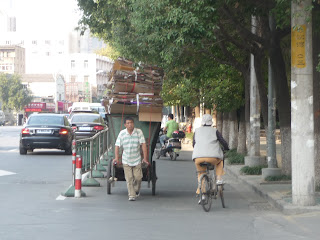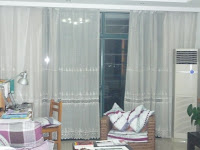January 6, Sunday, Virginia’s birthday
I went with a guide today, after several weeks of trying,
to the Nanjing Memorial Hall, http://www.nj1937.org/english/default.asp
, the museum commonly referred to as the Nanjing Massacre Museum. I am relieved that the Canadian government is not
allowing to happen with Winnipeg’s Asper Foundation Human Rights Museum what
has happened here. It is not possible
for me to judge whether the intent is to memorialize the atrocities and trauma
of the event, or to ingrain hatred of the Japanese. My student is generally a fair minded lad, I think, and
sensitive. But he too is
unforgiving. Taiwan is China, Tibet is
China, Diaoyu Islands are China. What is
not China?
How are the events of the Japanese massacre, over the course
of a month from December 13, 1937 to January 14, 1938, of some 300,000 Chinese
civilians different from the Tutsi massacre of Hutus in Rwanda, the Ukrainian
Hlodomor, the German Holocaust of Jews?
I hope I would have the courage, in similar circumstances to kill myself
before I would do such horrific things to others. What is done to people’s minds that they will
laugh as they kill innocents, or for that matter those they belief to not be
innocent. Farmers crossing a field with
hoes in hand, 3 year olds gunned down, old women, young women raped, and
murdered.
My guide commented that he was brought to the “old” original,
and much smaller museum as a primary student.
At that time the archeological remains of mass graves, which he referred
to as the bones room, was a part of the display. There were then some photos too. He said the children, boys especially, just
used the open areas to run around in and he had little lasting impression. But I cannot think it an appropriate place to
bring primary students. Those mature
enough to understand much, or those imaginative enough, would surely have
unanswerable nightmares. And for those
not so, it would be a waste of time. As
middle school students and seniors, yes. It has value provided it is dealt with
in a way that focuses on human rights rather than promoting hatred. Considering my reading of articles around the
recent Diaoyu Islands debate, the rhetoric and “news” carried such inflammatory
language, I hesitate to believe that human rights would be the focus.
The guide asked me what was the part of the museum that I was
most impressed by. Certainly the photos
of masses of unidentifiable bodies was impressive. Why were so many of the bodies naked from the
waist down? Not only women, but men and
children too? And the 2 “bones” rooms,
one in the original area and one in the new, spacious, hauntingly gloomily lit
new museum, were impressive. Skeletons
unearthed, some whole, some not; some just jumbles of seemingly random human
bones.
But most impressive to me were the narratives and videos
(even though I could not understand them) of women who survived the “Comfort
Women’s Centres”. To constrain the
wonton raping of Chinese women in the months and years following the Japanese
occupation, the Japanese commanders decreed that Comfort Women’s Centres be
established in each major city so that the sexual appetites of the Japanese
soldiers could be sated. Anywhere from 5
to 50 women would be abducted from their homes and brought to the comfort
centres for institutionalized humiliation.
Most were teenagers. They did
“chores” during the day. At one cited
centre the 6 women housed there used their daytime hours to hand wash the
laundry of 100 men, and at night they were systematically raped and/or gang
raped between 5 and 20 times, depending upon how attractive they were. After 2-3 years, if they were still alive,
and the majority were apparently not, they were either so sick and infected by
multiple venereal diseases, or pregnant and therefore no longer sufficiently
comely to be desirable, they were “released” to the streets, to find their way
to whatever might be left of “home”, or to die, beyond Comfort.
I had not realized it but as my guide pointed out, the Qing
Dynasty, collapsed in 1911 and in the ensuing years while the National Peoples
Republic was rebuilding the country, there was rampant poverty, the army was
weak and there was inadequate military might or strategic foresight and skill
to defend against the attacks that began in 1931. At that time the French owned/controlled bits
of China, and the Brits, too. But, he
said, it seemed the Japanese wanted to take over the entire country because of
their dire need for additional resources.
And, perhaps, had it not been for
the intervention of the Russians and WWII, they might have had it. And just as is the case in Africa, why did
the West not intervene? I guess they might
have, but on the side of the Japanese because of the Red terror that was
China. Thanks be for the Russians. The ongoing Diaoyu Islands debate simply
keeps the fires of hatred burning. They
are tiny islands, but the brand of the Japanese is on them despite history’s
claim that they are Chinese. I do not
know the history but I know the rhetoric here is very inflammatory.
There are many very poignant sculptures on the grounds which
are wide open graveled spaces, speaking to the unnamed horrors that lie within. The museum covers not only the Massacre
itself, but the WWII years as well, until the Japanese were repelled, and
leaders executed or long imprisoned as war criminals. One could not be tried, the uncle of the
Japanese royal Hirohito family whose members it was agreed would not be
prosecuted. The Japanese referred
throughout to that month of killing as an “incident”, and therefore, their
view, captives need not be treated with the respect the international community
required to be shown Prisoners of War. Thousands
were beheaded, or individually shot and toppled over the banks of mass grave
pits. Toward nightfall, anxious to be
done the day’s job of killing thousands, machine guns might be used. Then, so that their deed was hidden, the
Japanese would spend the night using heavy machinery or shovels to cover the
graves. A few, by hiding under bodies,
feigning death, surviving multiple bayonet stabbings, or hiding in rivers and
caves, did escape to the refugee centres established by the German Nazi John Rabe,
(https://www.google.ca/search?sourceid=navclient&aq=&oq=nanjing+massacre+rabe&ie=UTF-8&rlz=1T4ACAW_enCA353CA378&q=nanjing+massacre+rabe&gs_l=hp...0i30j0i8i30l2.0.0.0.5347...........0.mT_vDbryzbg)
by American and British humanitarians, who complained often and as forcefully
as they dared about the raping, pillaging and murdering that was going on. But to little avail. One commander’s order sheet read “Kill them
all.”
As a side note, some of the heaviest fighting took within 2 km of my school
at Purple mountain where Sun Yat Sen’s mausoleum is. It boggles my mind and breaks my heart to imagine the scene.



























